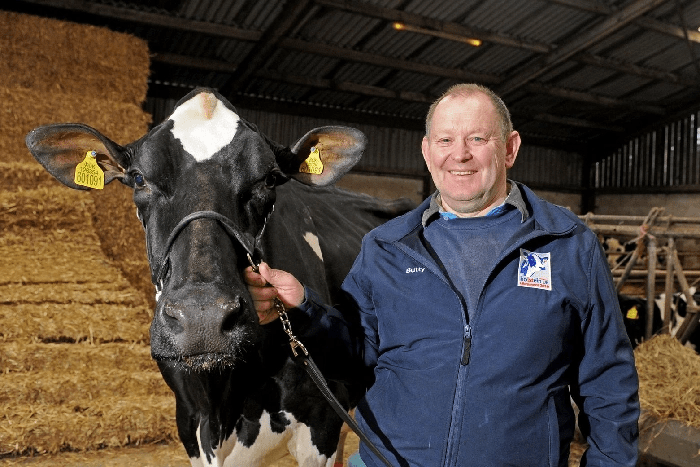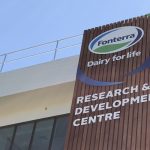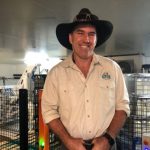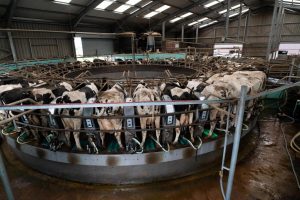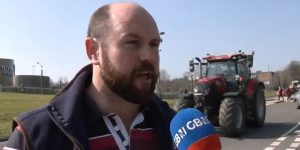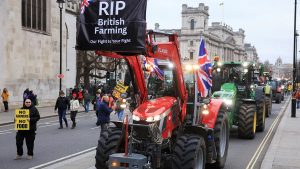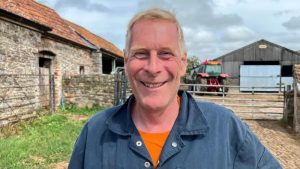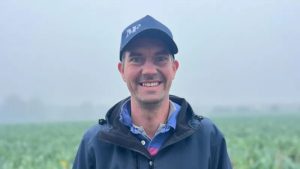
In July their outstanding cow Newbirks Jazz 1584 was breed champion and interbreed dairy champion at the Royal Welsh Show and followed that up with a career-high when she was awarded champion at the Holstein National Show in Telford.
“This has to be my proudest moment,” says Robert. “We’ve won at the Dairy Event and Agriscot in other years, but this tops the lot. After we won with her in Wales at their centenary show she was tipped as favourite for the national title. My nerves weren’t right good that day beforehand.
“In the last ten years we’ve had three amazing cows that have won at all the major shows. Saxelby Goldwyn Rose and Ards Duplex O Ruth were the other two and they brought us fantastic success, but Newbirks Jazz 1584 is exceptional. She is such a natural cow. When we take her to shows she just walks out of the wagon, goes into her stall and sits down. It’s as though she’s saying, ‘I’m enjoying this’.
Spotting her show potential Robert bought her from fellow Holstein dairy farmers David, Claire and Suzy Lawson of Mill Farm in Arthington.
“You get a good idea about the cow from looking. I bought Newbirks Jazz 1584 as a heifer in milk at Otley Show. I went into the marquee and went wow, that’s a good heifer and with a bit of luck she could be really good. She has far outstripped what I thought she could be and had already been judged second in Europe when representing Holstein UK.”
Sadly the Great Yorkshire Show didn’t fit into Robert and Elaine’s plans for Jazz this year, but they still had reserve champion and took the interbreed dairy pairs title at Harrogate.
“We left Jazz at home because she was going to the Royal Welsh the following week. It’s a bit like putting your head on the chopping block when you’ve left your best cow behind, but we still had a good show.”
This is Robert’s 50th season of showing dairy cattle as he started through Lawkland YFC in 1970. It’s a year of achievements and anniversaries because he has also taken on the role of president of the Yorkshire Holstein Club that celebrates its 100th anniversary since originally having been formed as the Yorkshire British Friesian Breeders Club in 1919.
“Yorkshire was the first county to have a breeders’ club. It started out as British Friesians and then became the Yorkshire Holstein Friesian Club before becoming the Yorkshire Holstein Club in 1999. At home we started going into Holstein bloodlines in the late 1970s. It was a simple decision for us as they give more milk and are a lot calmer than Friesians.
“Our herd average is around 10,600 litres with our milk going to Arla. Newbirks Jazz 1584’s latest production figures are 14,594 litres for the year. The Holsteins are a more balanced type of cow today, not the big lanky things that some knew them as.
“We have 150 milkers all year round from a total of around 175 cows. We prefer to get them out on grass in the first week of May until the beginning of September but they came in on August 10 this year because it became very wet.
“We feed them a silage based diet from our three cuts, with wholecrop, sugar beet and a blend using TMR topped up in the parlour with dairy cake. The TMR doesn’t bring about any more milk. It’s just easier.
“Our numbers are a little down at the moment, but we’ve a lot of heifers to calve in the new year. We keep all our females and with most cows calving to sexed semen that we started with around five years ago that’s the lion’s share of the progeny.
“By using sexed semen it has done away with our bull market. We used to rear 10-12 bulls a year. We’re now chasing up any problem cows that we can’t get into calf through sexed semen with a Limousin bull.”
It is Robert’s first year of a two-year term as president of the Yorkshire Holstein Club. He has seen a dramatic change in the dairy farming world since the 1990s.
“There are a lot less dairy farmers. Even here I used to be able to count around eleven dairy farms across this valley where now there are just two. It’s a different time. At one time the Yorkshire Holstein Club would book for three coach loads of farmers to go off to see dairy farms in another area of the UK. Nobody really has that kind of time anymore and there are not the same amount of people in dairy farming.”
Robert and Elaine now only generally enter the main shows. They find they are between a bit of a rock and a hard place when it comes to entering the local shows.
“It’s a tough one really because if you don’t support you are sometimes seen as being miserable and then when you do there are some who think you are too big for it. You can’t win really, but we always like to support local shows and we will still go to at least have a look. After all, if we hadn’t been at Otley Show we wouldn’t have seen Newbirks Jazz.”
It has been quite a decade for Robert particularly. As well as having the best three cows he has ever shown he also so nearly lost his life when falling through a dairy shed roof he was repairing in 2011. He spent three and a half weeks in a coma after also breaking his pelvis in two places, breaking nine ribs and suffering a collapsed lung.
Robert is a third-generation dairy farmer, his grandfather Frank having taken on the tenancy of Batty Farm next door in 1947. Linghaw Farm was purchased in 1973 and the combined acreages of the two farms make up today’s land of just short of 300 acres.
“I went into partnership with my mum and dad Annie and Dick in 1979 the year Elaine and I were married. The partnership changed to just me and dad in 1987 and to me and Elaine in 2003. We used to have sheep and we’ve just started with them again this September for the first time in 18 years.
“We’ve 150 that will lamb in April and we will sell with lambs at foot. The man who works with us Chris Chappell and our son-in-law James Atkinson, married to our daughter Sandra, decided they wanted to lamb sheep again.”
Robert and Elaine’s other two daughters Pamela and Kathryn run the Flowerfields florists, fruit and vegetables shop and since January 2018 the post office in Bentham.
“The girls have run the Interflora flower shop for 16 years,” says Elaine. ‘When the post office looked as though it may go the same way as the Nat West and HSBC closing their branches Pamela said if it went the village would die. They are making sure it doesn’t.”
